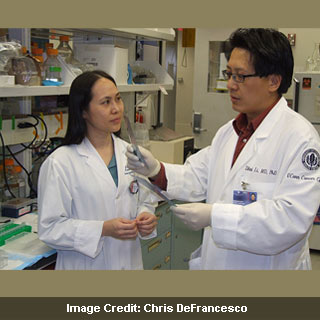
This novel finding appears to be built upon a century-old theory that immunizing with embryonic materials may produce an anti-tumor response. However, this theory was noted to have never before been advanced beyond the use of animal embryonic materials. Also, the discovery that human stem cells are able to immunize against colon cancer is apparently both innovative and unexpected.
Lead author of the study and an immunology expert, Dr. Zihai Li said that, “This finding potentially opens up a new paradigm for cancer vaccine research. Cancer and stem cells share many molecular and biological features. By immunizing the host with stem cells, we are able to ‘fool’ the immune system to believe that cancer cells are present and thus to initiate a tumor-combating immune program.â€
For the purpose of the study, the team was noted to have vaccinated laboratory mice with human embryonic stem (hES) cells. They seemed to have found a consistent immune response against colon cancer cells. Moreover, they appeared to have witnessed dramatic decline in tumor growth within the immunized mice. This revealed that immunized mice could possibly generate a strong anti-tumor response via the application of hES cells.
“Although we have only tested the protection against colon cancer, we believe that stem cells might be useful for generating an immune response against a broad spectrum of cancers, thus serving as a universal cancer vaccine,†says co-author of the study and immunology expert, Dr. Bei Liu.
The team also discovered that while natural embryonic stem cells are able to provide a response, artificially induced pluripotent stem cells (iPSC) may perhaps not be able to do so. This seems to be important, as it challenges the theory that iPSC are the same as hES cells. Also, it suggests that hES cells could be able to replace iPSC cells at the forefront of stem cell study.
This study is known to be the first of its kind to involve human stem cells in vaccinating against colon cancer. In addition, it seems to represents collaboration between the laboratories of Li and Dr. Renhe Xu, director of the UConn Stem Cell Institute.
The findings of the study have been published in the journal, Stem Cells.

